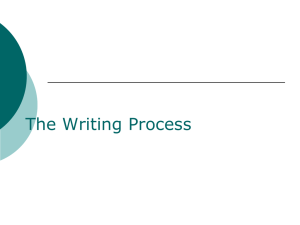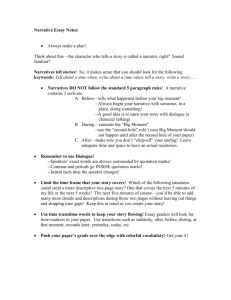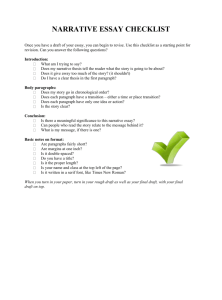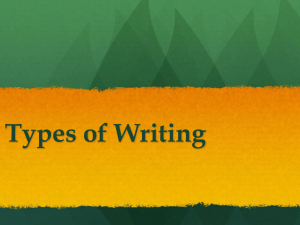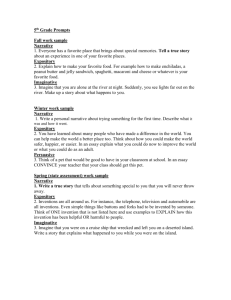Writing an Essay PPT
advertisement
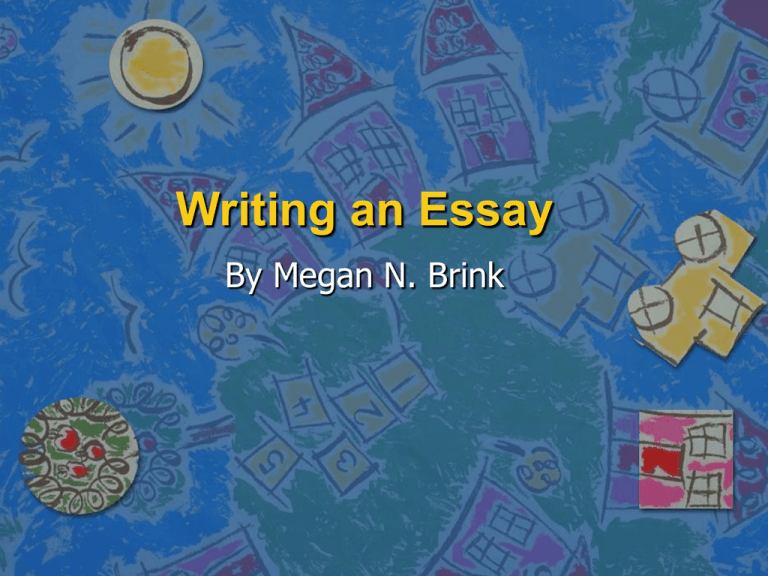
Writing an Essay By Megan N. Brink Writing is Not A Skill…. It Is An Art! Painters need a brush, musicians need notes, and writers need words. Carefully selected words are the tools that a writer uses to turn his average writing into beautiful works of art. Types of Essays There are three types of essays: Narrative Expository Persuasive We will be focusing on the first two: Narrative and Expository for Florida Writes NARRATIVE ESSAYS Telling a Story Narrative Essays A narrative essay is a STORY. The prompt, or writing topic, they give you will most likely have this key word in it: TELL. For example, “Tell about a time you went on a special trip.” This is a narrative, because of the word TELL. The Writing Process Before we write, we need to think about the steps involved in writing. 1. Prewrite 2. Draft 3. Edit/Revise 4. Proofreed 5. Publish Prewrite - Narrative Have you ever seen a cartoon movie? They use a Story Board to sketch their ideas before they do the whole movie and include each detail! This helps them get their ideas flowing and keeps them on track. For a narrative essay, when you see the words TELL on a prompt, sketch a STORY BOARD Narrative Story Boards 1. Draw 5 or 6 boxes (you can do more, but I would suggest at least 4). 2. In each box you will draw a picture of a scene, in order, in your story. 3. Each box will then be used to help you describe a paragraph on your essay. Narrative Story Boards Let’s do one together! Remember that each square is a scene, or an event that happens next. Try to add target skills to each box. Prompt: Tell about a time you did something scary. Setting/Character Strong Verb 1 2 Simile 3 Heard a clanking Conflict Onomatopoeia 4 RATTLE, RATTLE, RATTLE Take-Away Metaphor 5 I became a relieved librarian when I discovered it was only a cat. I crept as quietly as nervous mouse. 6 I’ll never forget that scary night! Prewrite - Expository For an expository essay we are asked to EXPLAIN an idea or thought we have. For this, we use a Happy Alien! Draw one head and three legs. The head holds the main topic and each leg is a supporting detail. Happy Alien Let’s do one together! Prompt: Everyone has a favorite food. Explain what your favorite food is and why. Each leg will become one supporting paragraph, so make sure to think of lots of target skills to add when you write! You may want to write a grabber above him and a takeaway It’s cheesy! below him. Favorite Food: Pizza I eat it when I’m doing fun things. There are so many varieties! The Writing Process Before we write, we need to think about the steps involved in writing. 1. Prewrite 2. Draft 3. Edit/Revise 4. Proofread 5. Publish Narrative Draft: Writing Paragraphs After you write your Story Board, it’s time to add paragraphs. Remember, each paragraph is a block on your story board. When you write, you need to keep in mind that you need these things: You are ON TOPIC It has a BEGINNING, MIDDLE, and END You wrote CONTENT You included CREATIVITY skills Example Rubric Your essay needs to at least be on topic and the correct type in order to get more than a 0. Your essay should have…. On Topic Ideas Every sentence focuses on the topic You have written a unique/interesting essay about the topic Conventions Proper punctuation Proper use of capitals Correct spelling of fourth grade words and below (especially tricky words) Your essay needs to have at least a beginning, middle, and end in order to get a 3. Writing Rubric Organization Beginning I have a beginning. I used a GRABBER Middle - Content Grabber Answered Who, What, When, Where, Why, and How Added information to amplify my thoughts or ideas I used transitions If a narrative, it has a conflict If an expository, it has reasons/points with examples and details. End I have an ending. I used a TAKE-AWAY The more creativity skills, the higher your score (either 4, 5, 6). Self/Friend Score:______________ Actual Score: _________________ Creativity Word Choice Strong Verbs Sparkly Adjectives Juicy Colors Cool Transitional Phrases Onomatopoeia Alliteration One sentence with Dialogue/Creative Tags Voice Similes Metaphors Sensory Words Emotion Words Feeling statements Sentence Fluency Showing NOT Telling Please see my section on target skills under revision for more information on the specific items listed. The Writing Process Before we write, we need to think about the steps involved in writing. 1. Prewrite 2. Draft 3. Edit/Revise 4. Proofread 5. Publish Narrative- Edit/Revise When you are done writing your 1st draft. Go back and REVISE, REVISE, REVISE! Revise until time is up. Revise means to “see again.” Literally, look at your paper as if you were someone else and read it with a critical eye. What can you add and change? THIS IS NOT JUST A ‘FIX THE GRAMMAR/SPELLING’ TIME! Make huge changes to your word choice, organization, and sentence structure. The Writing Process Before we write, we need to think about the steps involved in writing. 1. Prewrite 2. Draft 3. Edit/Revise 4. Proofread 5. Publish Proofread After revising, go back and proofread your essay for grammar and spelling errors. All fourth grade level words should be spelled correctly. Play close attention to tricky words! Click on tricky words for a list. The Writing Process Before we write, we need to think about the steps involved in writing. 1. Prewrite 2. Draft 3. Edit/Revise 4. Proofread 5. Publish Publish In the classroom, stories and other writing can be written into a final draft with pictures! However, for Florida Writes, the students are EXPECTED to turn in rough drafts. They won’t look pretty! THEY SHOULDN’T! Just make sure it is legible.
